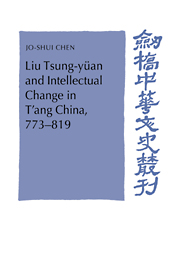Book contents
- Frontmatter
- Contents
- Acknowledgments
- Maps
- Chronology
- Abbreviations
- Introduction
- 1 Literati and thought in the early and middle T'ang
- 2 Liu Tsung-yüan and the circumstances of Ch'ang-an
- 3 805: The abortive reform
- 4 Declaration of principles: Tao and antiquity
- 5 Heaven, the supernatural, and Tao
- 6 Literary theory, canonical studies, and beyond
- 7 Sources of Liu's Confucian thought
- 8 The private sphere
- Conclusion
- Glossary
- Bibliography
- Index
Introduction
Published online by Cambridge University Press: 07 October 2009
- Frontmatter
- Contents
- Acknowledgments
- Maps
- Chronology
- Abbreviations
- Introduction
- 1 Literati and thought in the early and middle T'ang
- 2 Liu Tsung-yüan and the circumstances of Ch'ang-an
- 3 805: The abortive reform
- 4 Declaration of principles: Tao and antiquity
- 5 Heaven, the supernatural, and Tao
- 6 Literary theory, canonical studies, and beyond
- 7 Sources of Liu's Confucian thought
- 8 The private sphere
- Conclusion
- Glossary
- Bibliography
- Index
Summary
In China, the study of the Confucian classics and the discourse on Confucian doctrine have been an uninterrupted tradition; China thus produced no Confucian “renaissance” in the sense of the fourteenth- and fifteenth-century Italian humanist Renaissance. However, this does not mean that Confucianism has always maintained a high degree of intellectual vitality. In premodern China, at the intellectual level, the longest and most profound decline Confucianism suffered occurred during the period from approximately the third to the tenth century, that is, from the disintegration of the Han empire to the start of the Sung dynasty. This was an epoch in which Taoism and Buddhism successively predominated. However, the situation was reversed in the eleventh and twelfth centuries, with the emergence of a tradition commonly referred to as Neo-Confucianism. The Neo-Confucian movement of the Sung (960 – 1279) not only marked a potent Confucian revival, but also established Confucianism as the mainstream of thought in China until the May Fourth Movement of the early twentieth century. Neo-Confucianism, indeed, is one of the few key intellectual breakthroughs in China. This book concerns an intellectual development in the middle of the T'ang dynasty (618–907) that had important bearings upon the origins of this breakthrough.
Neo-Confucianism, however, is a vague and controversial term; some clarification about its usage in this book is thus required. Generally speaking, there are three views on this issue.
- Type
- Chapter
- Information
- Publisher: Cambridge University PressPrint publication year: 1992

